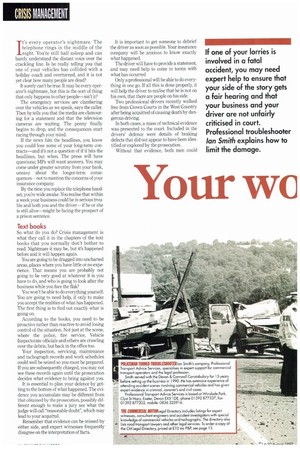Your wo
Page 48

Page 49

If you've noticed an error in this article please click here to report it so we can fix it.
st nightmare /t's every operator's nightmare. The telephone rings in the middle of the night. You're still half asleep and can barely understand the distant voice over the crackling line. Is he really telling you that one of your vehicles has collided with a holiday coach and overturned, and it is not yet clear how many people are dead?
It surely can't be true. It may be every operator's nightmare, but this is the sort of thing that only happens to other people—isn't it?
The emergency services are clambering over the vehicles as we speak, says the caller. Then he tells you that the media are clamouring for a statement and that the television cameras are waiting. The penny finally begins to drop, and the consequences start racing through your mind.
If the news hits the headlines, you know you could lose some of your long-term contracts—and it's not a question of if it hits the headlines, but when. The press will have questions; MPs will want answers. You may come under greater scrutiny from your bank, uneasy about the longer-term consequences—not to mention the concerns of your insurance company.
By the time you replace the telephone handset, you're wide awake. You realise that within a week your business could be in serious trouble and both you and the driver—if he or she is still alive—might be facing the prospect of a prison sentence.
Text books
So what do you do? Crisis management is what they call it in the chapters of the text books that you normally don't bother to read. Nightmare it may be, but it's happened before and it will happen again.
You are going to be dragged into uncharted areas, places where you have little or no expe. rience. That means you are probably not going to be very good at whatever it is you have to do, and who is going to look after the business while you face the flak?
You won't be able to do everything yourself. You are going to need help, if only to make you accept the realities of what has happened. The first thing is to find out exactly what is going on.
According to the books, you need to be proactive rather than reactive to avoid losing control of the situation. Not just at the scene, where the police, fire service, Vehicle Inspectorate officials and others are crawling over the debris, but back in the office too.
Your inspection, servicing, maintenance and tachograph records and work schedules could well be seized so you must be prepared. If you are subsequently charged, you may not see these records again until the prosecution decides what evidence to bring against you.
It is essential to plan your defence by getting to the bottom of what happened. The evidence you accumulate may be different from that obtained by the prosecution, possibly different enough to make a jury see what the judge will call "reasonable doubt", which may lead to your acquittal.
Remember that evidence can be missed by either side, and expert witnesses frequently disagree on the interpretation of facts. It is important to get someone to debrief the driver as soon as possible. Your insurance company will be anxious to know exactly what happened.
The driver will have to provide a statement, and may need help to come to terms with what has occurred Only a professional will be able to do everything in one go. If all this is done properly, it will help the driver to realise that he is not on his own, that there are people on his side.
Two professional drivers recently walked free from Crown Courts in the West Country after being acquitted of causing death by dangerous driving.
In both cases, a mass of technical evidence was presented to the court. Included in the drivers' defence were details of braking defects that did not appear to have been identified or explored by the prosecution.
Without that evidence, both men could have been reading this article from their prison cells and could have been facing the prospect of never working as WV drivers again.
It all sounds pretty grim, and it must be said that if an accident is genuinely your fault an expert witness cannot be expected to tell anything but the truth.
But in all too many cases hauliers and driver have had a raw deal due to lack of expert support at the right time.
Professional Transport Advice Services was recently called in by an operator whose vehicle was involved in a fatal accident.
The initial investigation by the authorities found that the braking system was operating normally and the driver was facing serious charges. A more detailed examination by PTAS experts discovered a braking fault that could not have been known of in advance by the driver or operator. Some people think that calling in an outsider for crisis management help at times like this takes some of the authority away from them but, in reality outside expertise supplements a company's existing resources. The important thing is call for help immediately.
In the difficult times following a major accident, it is important for businesses to concentrate on their customers instead of dealing with the myriad inquiries concerning the accident. Customers, and the public, need reassurance that you are as anxious as they are to establish just what did happen—as opposed to the media speculation which inevitably surrounds any serious accident.
Enforcement agencies Nothing can prepare you for a major accident—and you cannot compete with the enforcement agencies. They won't be against you, although at times it might not feel that
way. Those working at the scene will only be doing their jobs. When they have finished at the scene, they will remove the wreckage and continue the investigation somewhere else. You should take advantage of the opportunities to have someone present to look after your interests.
Comprehensive crisis management and detailed accident investigation are very much a team effort.
Insurers are generally keen to obtain early expert feedback about the precise circumstances of any potential major claim. Most insurers are prepared to absorb experts' costs in recognition of the savings in time and money made by seeking early expert help.
Given the lasting damage that a serious accident can do to your business and reputation, if the "nightmare" were ever to happen, seeking expert help could be the most useful call you make.
















































































































